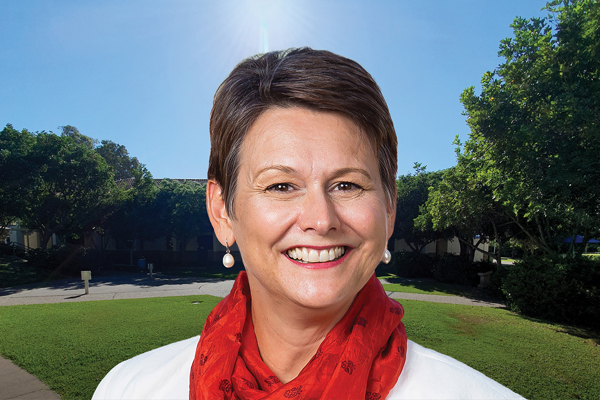A year into her role as Principal of Saint Stephen’s College on the Gold Coast, Kim Cohen discussed with SMJ what it means for everyone to be a marketer.
SMJ: Tell us about your career path. How did you become to be Head at Saint Stephen’s College?
KC: I started off teaching in South Africa, then when we moved to Australia 15 years ago, I got a job at Brisbane Girls Grammar School, which was an incredible way to start to my teaching career in Australia. Whilst there I always put up my hand to do whatever was required, which led to the Principal asking me to take on the pastoral care role of Acting Head of House. I absolutely loved it so applied for the position when it later became available. I did that for four years before being appointed as Assistant Principal of Students at Lourdes Hill College, and after three years became Deputy Principal at St Margaret’s Anglican Girls School, both in Brisbane.
I was Principal at The Glennie School in Toowoomba when this role came up at Saint Stephen’s College. Having been in girls’ education for so long I knew it would be quite a challenge to move to a co-educational school. But I had always encouraged the girls in my care to never shy away from challenges, so I decided to put my money where my mouth was and apply for the Principal position at a bigger co-educational school. I was successful, and it has truly been an incredibly positive experience. I’ve only been Principal at Saint Stephen’s during a pandemic, so that’s been interesting!
SMJ: Describe the Saint Stephen’s campus for us.
KC: It’s a very lush campus with a tropical feel to it; you feel like you’re walking into a resort surrounded by palm trees and beautiful grounds. At the same time, the facilities are second to none. Included in these are our Centre of Music Excellence, the Science in Action building, arts and technology areas, large ovals and a sports hall including two basketball courts and auditorium. Our street front is not large, but when people come through the gates they are surprised by the expanse of the campus. We like to think of it as a hidden treasure.
SMJ: Introvert or extrovert?
KC: Extrovert. Extroverts feed off other people for their energy, and that’s definitely me! I love meeting new people and spending time getting to know all about them.
SMJ: What are some of the common problems you’ve encountered in school marketing?
KC: All schools are (or should be!) nurturing places. All schools should offer rigorous academic programs. We want to market ourselves as something different, but at the same time ensure people know we have those strong attributes: an academically rigorous environment supported by a caring, professional staff. So, it’s difficult to pinpoint precisely how your school is different in a short blurb or a picture, and to maintain people’s attention for any period of time. We know the fantastic stuff we do, we know the fantastic facilities we’ve got, but how do we actually get this out so that the public know it too? It’s difficult to know exactly which demographic to target, and on which forums, especially in this day and age when there are so many of them. It’s really hard to establish exactly what works and how to best engage people.
SMJ: What do you think is the best way for a school Head to lead marketing?
KC: We’re not marketers, but we know education and we rely on knowing what it is that parents want. First of all, we need to ensure that we are offering what they want. Then we need to let them know we’re offering what they want. It’s important to have a committed, professional and knowledgeable marketing team or organisation who can support you in that, and be able to put what a Principal wants on paper and at the forefront. You need to have a marketing strategy, and ensure your values and vision are front and centre of everything you do. And it’s important that your messaging is really consistent and truly represents why you exist, who you are and what you stand for.
SMJ: How do you ascertain what it is that parents want, and does it vary that much from school to school?
KC: Not really! With our current parents, we do surveys once every year or two to see what it is that first attracted them to the school and what they see as the most important aspects; the things they look for and value in a school environment. We also refer to external organisations like Independent Schools Queensland (ISQ) and their survey, What Parents Want. What we’re finding more and more with our own parents is that they’re not necessarily wanting all students to be achieving ATARS of 90 and upwards. Certainly, they do want a strong academic focus and for their kids to be very well educated, but that doesn’t necessarily mean they are all getting top results. Parents want their children to be looked after and ready for the world beyond — they need to be on the pathway that is right for them as an individual. They’re looking for a school that provides a sense of wellbeing, has strong values and will strive to support their child to be the best that they can be whether that is intellectually, emotionally, creatively or physically.
SMJ: How do you use communications tools to motivate your staff and keep them aligned with your focus?
KC: I tell my staff every term that every one of us is a marketer. It’s not only our advertising and branding, it’s through what we say, through our conversations and through our actions. You’ve really got to sell it to your staff because every single one of them has to be involved in the implementation of your marketing strategy.
I also like to speak to staff face-to-face as often as possible. When I start at a new school, I meet with every single staff member individually. I have an open-door policy (as much as a Principal can have one), so that staff are very aware that I’m keen to listen to their ideas. During each term, we have a short meeting for the whole staff — teaching and non-teaching — every fortnight, and another two longer meetings. We also start each term with a catch-up meeting. While we need to look at the important things, we do the lighthearted things too, celebrating who we are and acknowledging personal milestones like new babies, engagements and marriages. I think it’s really important to build relationships with and amongst staff so that the school environment is one of trust and collegiality.
SMJ: Many schools wish they could foster this sense of community — how do you do that?
KC: My way of doing that is face-to-face but, having said that, I came into a school that already had a strong sense of community and had a beautiful culture. I was very lucky in that I didn’t have to work very hard to create that, but rather just work on maintaining it. Another thing I do with all the middle leaders — Heads of Year, Heads of Faculty, Directors of eLearning and Marketing, and so on — is have two sessions a term on various aspects of leadership and leading their teams.
Staff know they can approach me with ideas, and that I am willing to hear and support them to implement these if they have merit and fit with the strategy and vision of the College.
As far as community goes, we sometimes socialise together at the end of a week, or celebrate the end of term together. We do have a lot of celebrations, and I think that’s really important within a school, to acknowledge and celebrate your successes. I go out of my way to thank people, to recognise them for things I’ve noticed because so often it’s easy to just let that slip by. But I think all of that, even wishing people well on their birthday, adds to the sense of community.
SMJ: What place do you think customer experience plays and is going to play in schools in the future?
KC: It’s vital. Some of our customers — students and their parents — can be demanding in certain areas. There are some things that maybe our school cannot provide them, and we need to be upfront about this so that they go to a school that can. We need to be very clear as to what it is that we provide and then make sure we do provide that to an exceptional standard. There are expectations now that there never used to be, including increased involvement by parents. With a number of international students at our school, we’ve introduced a ‘MEET’ program — Mastering Everyday English Together — for their parents and guardians. They learn English together, make friends, go on outings, and it’s an amazing experience for all involved. That’s one small example. Parents and Friends Associations also play a very important role in not only the fundraising aspect but, maybe even more importantly, the ‘friend raising’ aspect, helping parents be part of the school. The Gold Coast sees a lot of transition, and the College plays an important role in helping people get settled and meet other parents. We do try to have a number of events where they are able to do that.
SMJ: What place does a marketing strategy have in supporting the overall school strategy?
KC: Marketing can be a case of, “how long is a piece of string?” There’s so much you can do and it’s hard to know what you should be doing. If you have a strategy and you know exactly where you’re headed and what you need to do over a period of time, then it helps you to really focus. It is so tempting when you see other schools actively marketing through, for example, large signs at the local shopping centre or advertisements at the movies, to ask, “why aren’t we doing that?” It becomes overwhelming because there’s so much to do and it is always on a limited budget. You need a strategy to focus on, that the whole school is focusing on together. It’s vital that everybody in the school be part of the marketing strategy, buy into it and implement it.
SMJ: What’s the single most valuable lesson you’ve learnt in relation to school marketing and communications?
KC: It’s so easy to paint a beautiful picture, but too often I see top-class marketing of a school where the staff are not aware of how their school is being marketed. How do they know that they have to deliver on that? You have got to deliver on what you promise.
insight applied
Know and offer what parents want, and tell them what you’re offering.
Community and customer experience are vital.
Everyone at your school is a marketer.
Deliver on what you promise.






